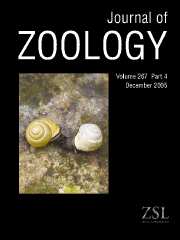Article contents
Between-litter siblicide in captive Indian false vampire bats (Megaderma lyra)
Published online by Cambridge University Press: 01 August 2000
Abstract
Sibling rivalry seems to contradict Hamilton's rule of maximizing inclusive fitness (Hamilton, 1964). However, when critical resources are scarce and the competitors are close kin the individual must weigh the direct versus the indirect components of its inclusive fitness (Mock & Parker, 1997). In facultatively siblicidal species, conflicts arise mainly because of the phenomenon of ‘parental optimism’, in which the parents attempt to raise a larger brood than the average amount of expected resources allow (Lack, 1954; Temme & Charnov, 1987; Mock & Forbes, 1995). If critical resources are low, weaker or subordinate offspring may be killed by a stronger or dominant sibling. Sibling mortality may result from direct physical damage and/or socially enforced starvation (Mock, 1984).
- Type
- SHORT COMMUNICATION
- Information
- Copyright
- © 2000 The Zoological Society of London
- 3
- Cited by


